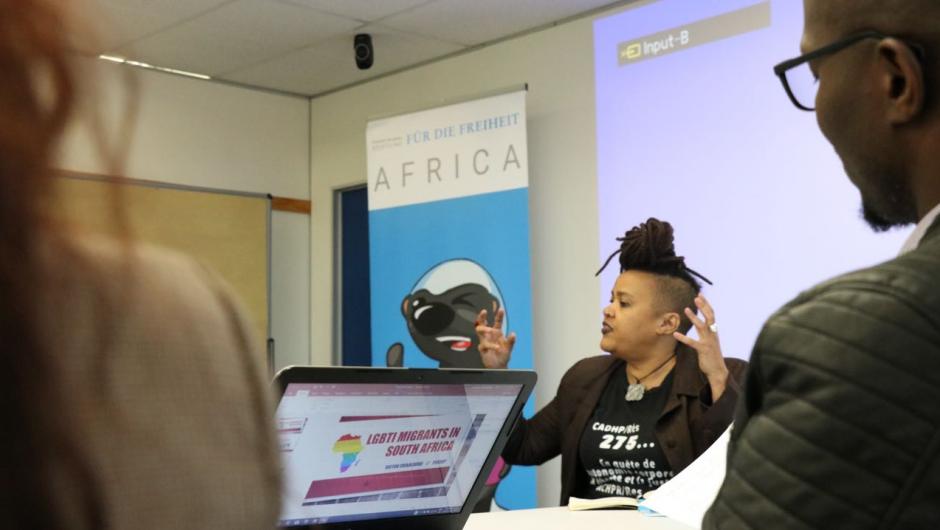Liberal Responses to LGBTI Challenges in Africa

The workshop titled “Liberal Responses to LGBTI Challenges in Africa” sought to bring together activists and public representatives from across the region who are actively engaged in the LGBTI activism. There were three intended outcomes for the workshop (1) to share an understanding of the status quo of the sector (policies, challenges, strategies and actions) (2) to identify the key gaps and (3) to formulate liberal responses to these challenges. Expert input was provided by three resource persons:
Dawn Cavanagh from Coalition of African Lesbians (CAL). Her aim was to give a general contextual overview on LGBTI and specifically speak on intersectionality, language, labels and challenges. Matthew Clayton who represents the Triangle Project was to give an international perspective on LGBTI the policy framework and gaps. Victor Chikalogwe from People Against Suffering, Oppression and Poverty (PASSOP) was to speak on challenges faced by African migrant communities across the continent.
Dawn Cavanagh provided a very challenging contextualisation of the LGBTI, the labeling and use of language; what holds true and the fluidity of the context. Her imagery of intersectionality as a more apt description of LGBTI brought some interesting discussion as did her proposition that the struggle of LGBTI (and Q) could be regarded as a human rights struggle at its most basic level. She also spoke on the difficulty with which regional LGBTI NGOs are face in garnering support from regional human rights watch dog institutions. Matthew Clayton spoke on the legislative framework and how it can both support and impede the cause of LGBTI. He referred to the enabling environment, that the Constitution creates many pieces of seemingly irrelevant legislation that has an insignificant impact on LGBTI. He also spoke of the range of laws across the continent affecting LGBTI. Victor Chikalogwe discussed the plight of foreign nationals and refugees on securing fair treatment, the challenge becomes more difficult if they are LGBTI. He gave his personal story as a testimony of the difficulty faced by foreign LGBTI in South Africa, a country they thought would guarantee them fair treatment.
Following Dawn Cavanagh’s input, there was a strong contestation around the proposition that the LGBTI is essentially a human right’s struggle vs the view that LGBTI has specific challenges because of their orientation. The external focus identifies a range of issues:
- Policy and legislative environment: Favourable policy that is not implemented effectively or not utilised by LGBTI to advance the cause. Some gaps in legislation/policy.
- Education: Perceptions and knowledge gaps. Information not available or does not reach society. Harmful effects of poor socialisation processes. Cultural barriers and constraints: traditional roles of male/female; Parenthood. Reaction to “coming out”; Loss of family support
- Religious: criticism, rejection and ex-communication; viewing LGBTI as sinful; social exclusion across most faiths.
- Economic status: Poor people generally (and so also LGBTI) have lesser opportunity and access to resources, information and support services.
- Urban/rural: Rural-based LGBTI experience greater effect of the challenges than urban-based LGBTI experience.
Response to the problem areas/concerns/challenges include:
Policy responses - changing accountability and not necessarily legislation
- fighting for better equitable resource distribution,
- addressing gaps in customary law and traditional practices,
- health/mental health and health resources (primary to tertiary care).
Education - at formal school level; Change brought in at curriculum level.
Societal - socialisation
- finding straight allies, working with those sympathetic and willing to support the struggle,
- change current religious responses (faith-based bodies),
- representation (who speaks for us - at international to regional to national level). How and by whom are we represented at regional and international bodies?
Institutional support - Corporate support: how can we influence CSI spending?
- passion intention,
- building LGBTI NGO capacity; making NGO working in the sector stronger and more effective.
Safety - within and from without the sector
- human rights organisations delivering on their mandates,
- international conventions and protocols protecting the rights and welfare of.
LGBTI
- safety and security agencies: how do they deliver on their mandate to serve and protect? Sensitising the police services.